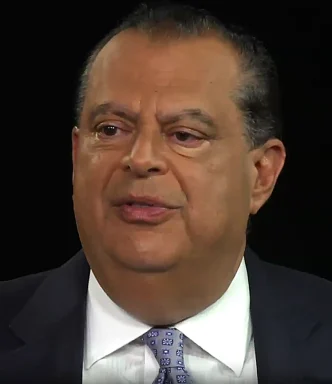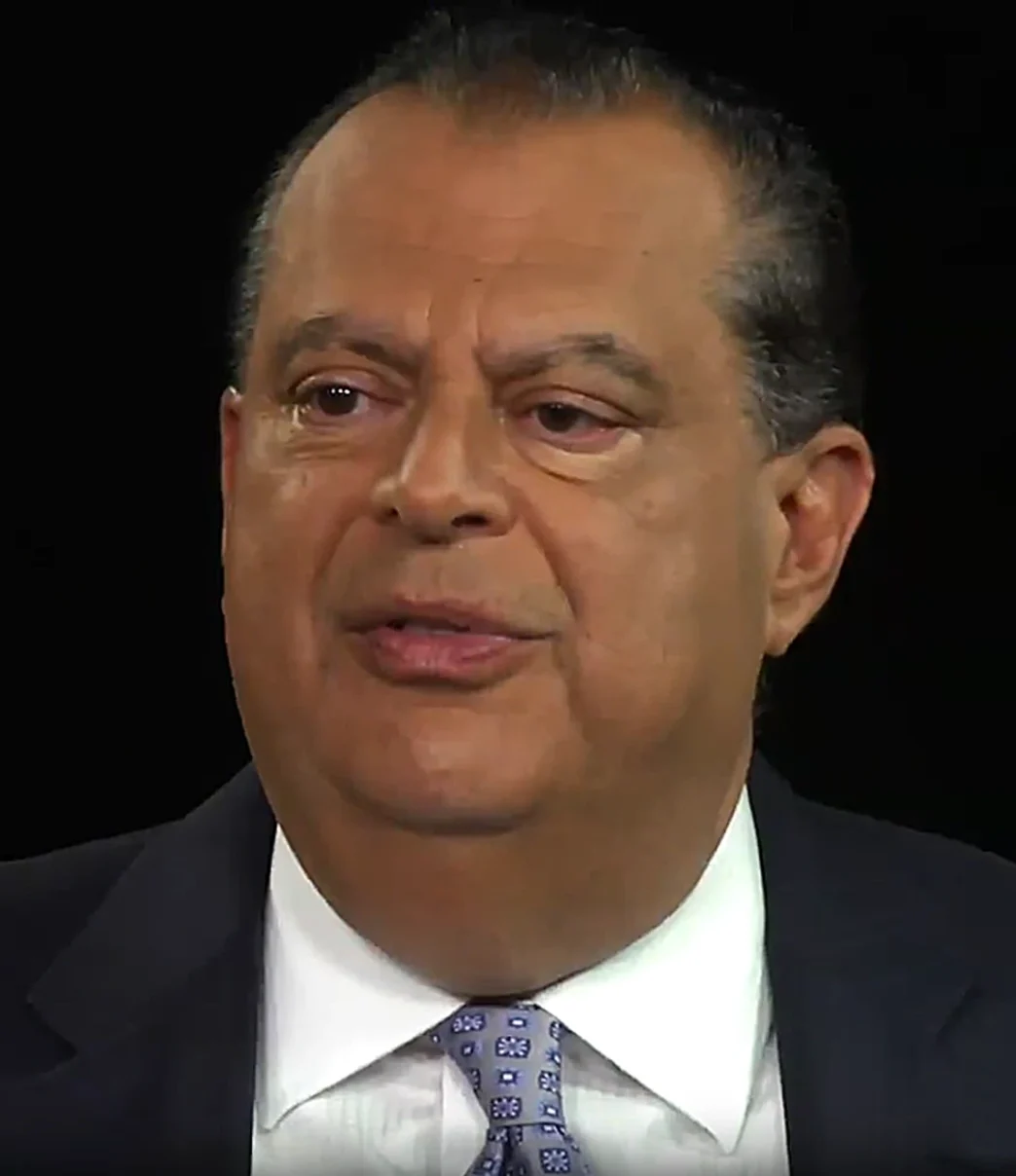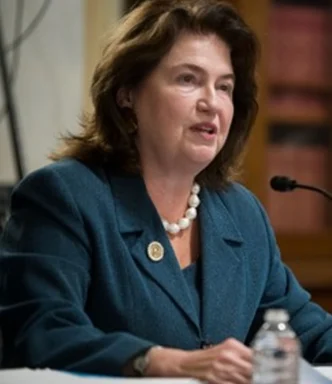Quick Information
| Full Name | Edward Spencer Abraham |
| Date of Birth | June 12, 1952 |
| Age | 72 years old |
| Place of Birth | Lansing, Michigan, USA |
| Heritage | Lebanese-American |
| Religion | Eastern Orthodox Christian |
| Spouse | Jane Abraham () |
| Family | Married to Jane Abraham; three children |
| Education | |
| Undergraduate | Michigan State University (BA in Political Science and Social Science, 1974) |
| Law Degree: | Harvard Law School (Juris Doctor, 1979) |
| Key Interests: | Golf, reading |
| Astrological Sign: |
Early Life and Education
Spencer Abraham’s early life is rooted in his upbringing in Michigan, where he was born on June 12, 1952, in East Lansing. As the son of Juliette Elizabeth, a member of the Michigan Republican State Central Committee, and Eddie Joseph Abraham, he grew up in a family engaged in civic and political matters. Of Lebanese descent, Abraham was raised in Auburn Hills, Michigan, as a member of the Eastern Orthodox Church. His father worked in the automobile industry before eventually opening a small store. This environment fostered values of hard work, community, and ambition, which Abraham carried into his future endeavors.
Abraham’s education laid the foundation for his impressive career in law and politics. After graduating from East Lansing High School, he pursued his undergraduate studies at Michigan State University, where he was an Honors College graduate in 1974 with a Bachelor of Arts degree in political science and social science. His intellectual curiosity and growing political conservatism took root during his college years, as he developed views emphasizing individual freedom and economic opportunity. He continued his academic journey at Harvard Law School, earning a Juris Doctor degree in 1978. While at Harvard, Abraham co-founded the Harvard Journal of Law & Public Policy, which later became an official journal of the Federalist Society, a group he also helped establish. These experiences not only honed his legal acumen but also solidified his commitment to conservative principles, setting the stage for his impactful political career.
Marriage and Relationship
Spencer Abraham is married to Jane Abraham, who has been active in political and social causes, including serving as chair of the Susan B. Anthony List, an organization that supports pro-life political candidates. Together, they have three children. The family has resided in both Michigan and Virginia.
Early Political Career
Spencer Abraham’s political journey began shortly after his graduation from Michigan State University. His passion for public service and conservative principles quickly drew him into the political arena. In the mid-1970s, Abraham managed two congressional campaigns for Republican Clifford W. Taylor, though both were unsuccessful against Democratic opponent Bob Carr. Despite these early setbacks, Abraham’s dedication and strategic thinking caught the attention of Republican leadership. He went on to attend Harvard Law School, where he co-founded the Harvard Journal of Law & Public Policy, a publication that became a platform for conservative legal thought. During this time, he also played a key role in establishing the Federalist Society, an influential network of conservative and libertarian lawyers and legal scholars that would later shape significant policy debates in the United States.
In 1983, Abraham took on a pivotal role as chairman of the Michigan Republican Party. At the time, the organization was burdened with significant debt and political challenges. Abraham demonstrated remarkable leadership and organizational skills, erasing the party’s debt and raising an additional $2.5 million in funds. Under his guidance, Michigan Republicans achieved major victories, including gaining control of the state legislature for the first time in a decade and delivering a strong margin of support for President Ronald Reagan’s re-election campaign in 1984. Abraham’s success in revitalizing the party earned him widespread recognition and positioned him as a rising star in Republican politics.
Abraham’s political influence continued to grow in the late 1980s and early 1990s. In 1990, he became Deputy Chief of Staff for Vice President Dan Quayle, serving under William Kristol. Known for his meticulous attention to detail and strategic insight, Abraham excelled in this role, balancing the demands of high-level political strategy with day-to-day operations. By 1991, he had ascended to co-chairmanship of the National Republican Congressional Committee (NRCC), where he played a crucial role in coordinating Republican efforts to secure congressional victories. Though he narrowly missed being appointed chairman of the Republican National Committee in 1993, this disappointment motivated him to set his sights on higher office. In 1994, Abraham launched a successful campaign for the U.S. Senate, marking the beginning of his influential career on the national stage.
U.S. Senate Career
- Election to the U.S. Senate (1994)
Spencer Abraham was elected as a U.S. Senator from Michigan in 1994, marking a significant milestone in his political career. His victory was notable as he became the first Republican to secure the Senate seat since 1978. Running on a platform focused on lower taxes, free trade, and family values, Abraham captured the support of Michigan voters with his commitment to fiscal responsibility and economic growth. His election reflected a broader wave of Republican success across the nation during the mid-1990s.
- Key Legislative Focus
Throughout his Senate career, Spencer Abraham prioritized several core legislative areas:
- Tax Cuts: Abraham pushed for tax reduction policies to ease financial burdens on individuals and businesses, aligning with his conservative economic principles.
- Free Trade: He supported free trade agreements, emphasizing their role in boosting the economy and creating job opportunities.
- Term Limits: Abraham advocated for congressional term limits, reflecting his belief in accountability and reducing entrenched political power.
- Immigration Reform: One of his most impactful contributions was his work on H1-B visa expansion, which allowed highly skilled foreign workers to contribute to the U.S. economy.
These focus areas demonstrated his commitment to pro-growth economic policies and efficient governance.
- Key Legislative Achievements
During his time in the Senate, Abraham played a key role in passing several important pieces of legislation:
- Social Security Preservation Act: Aimed at protecting Social Security funds from being diverted to unrelated government spending, ensuring financial security for future retirees.
- Anti-Cybersquatting Consumer Protection Act: This legislation tackled the misuse of internet domain names, protecting businesses and individuals from trademark abuse in the digital age.
- Government Paperwork Elimination Act: Abraham championed efforts to reduce bureaucratic inefficiency by promoting electronic documentation and streamlining government services.
These bills highlight Abraham’s focus on modernizing government processes and protecting the rights of businesses and citizens.
- Committee Memberships
Spencer Abraham served on several influential Senate committees, giving him a platform to shape national policies:
- Budget Committee: Focused on responsible federal spending and balancing the national budget.
- Commerce, Science, and Transportation Committee: Addressed issues related to infrastructure, technological advancements, and economic policy.
- Judiciary Committee: Played an active role in addressing immigration policies, judicial appointments, and legal reforms.
- Small Business Committee: Advocated for initiatives supporting entrepreneurs and small business owners across the country.
These committee memberships allowed Abraham to influence a wide range of legislative priorities, solidifying his reputation as an effective policymaker.
- Significant Achievements
Spencer Abraham’s contributions extended beyond legislation, reflecting his dedication to national values and cultural heritage:
- Rosa Parks Congressional Gold Medal: Abraham played a pivotal role in nominating civil rights icon Rosa Parks for the Congressional Gold Medal, honoring her legacy in the fight for equality.
- “Made in the USA” Label Defense Act: Abraham championed this legislation to ensure transparency and integrity in product labeling, supporting American manufacturers and consumer trust.
These achievements showcased his commitment to honoring American values and protecting economic integrity.
- Reelection Defeat (2000)
In 2000, Spencer Abraham faced a challenging reelection campaign against Democratic challenger Debbie Stabenow. The race was highly competitive, with Abraham facing criticisms over his positions on healthcare and immigration. Despite his strong legislative track record, special interest groups and campaign dynamics shifted the tide against him. In a closely contested election, Abraham narrowly lost his Senate seat. While his time in the Senate ended, his contributions during his tenure left a lasting impact on policy and governance.
Spencer Abraham’s Senate career was marked by legislative accomplishments, principled leadership, and dedication to public service. Although his reelection bid fell short, his work laid the foundation for his subsequent role as U.S. Secretary of Energy, where he continued to serve the nation with distinction.
U.S. Secretary of Energy (2001–2005)
- Appointment as U.S. Secretary of Energy (2001)
In 2001, Spencer Abraham was appointed as the U.S. Secretary of Energy by President George W. Bush. This appointment came at a critical time when the country faced mounting energy challenges, including power shortages and rising energy costs. Abraham’s selection surprised some observers due to his previous support for abolishing the Department of Energy during his Senate tenure. However, his leadership skills, strategic thinking, and deep experience in government quickly proved essential in navigating the complex energy landscape. Abraham took office with a focus on balancing immediate energy crises with long-term policy solutions, setting the stage for significant reforms and advancements in the nation’s energy strategy.
- Key Responsibilities
As Secretary of Energy, Spencer Abraham tackled several critical responsibilities during his tenure:
- Addressing the California Energy Crisis: Abraham played a central role in managing the rolling blackouts and skyrocketing energy prices plaguing California. He emphasized market-based solutions while ensuring energy suppliers met their commitments to stabilize the grid.
- Overseeing National Energy Policy Development: Abraham contributed to formulating and implementing a comprehensive national energy policy, emphasizing energy independence and sustainability.
- Promoting Hydrogen Fuel Cell Research and Clean Coal Technology: Under Abraham’s leadership, significant investments were directed toward advancing hydrogen fuel cell technology and expanding clean coal research, laying the groundwork for cleaner and more sustainable energy solutions.
- Strengthening Nuclear Safety and Nonproliferation Programs: Abraham prioritized nuclear safety and nonproliferation efforts, working with international partners to secure nuclear materials and prevent their misuse.
These responsibilities showcased his commitment to balancing immediate energy demands with long-term innovation and security.
- International Contributions
Spencer Abraham understood the importance of international collaboration in securing energy stability. He established and strengthened energy partnerships with key global players, including China, Japan, Russia, and South American nations. These partnerships aimed to enhance global energy security, facilitate technology exchanges, and open new avenues for resource cooperation. Abraham’s diplomatic efforts ensured that the United States remained a key influencer in global energy markets while fostering mutually beneficial agreements. His work in building these alliances emphasized energy diplomacy as a cornerstone of U.S. foreign policy during his tenure.
- Achievements
During his time as Secretary of Energy, Spencer Abraham made significant strides in improving both the department’s internal operations and the nation’s energy outlook:
- Improved Department of Energy Management and Efficiency: Abraham implemented reforms that streamlined the Department of Energy’s operations, improving accountability, efficiency, and responsiveness. Under his leadership, the department went from being one of the lowest-ranked government agencies to one of the most effective, according to the Presidential Management Agenda scorecard.
- Advocated Against Reliance on Foreign Energy Imports: Abraham consistently emphasized the importance of reducing dependence on foreign energy sources. He promoted policies aimed at increasing domestic energy production and diversifying energy sources to ensure long-term security.
Post-Government Career
After stepping down as U.S. Secretary of Energy in 2005, Spencer Abraham transitioned seamlessly into the private sector, leveraging his extensive experience in government, energy policy, and international relations. He founded The Abraham Group, an international strategic consulting firm based in Washington, D.C., where he serves as Chairman and CEO. The firm specializes in advising businesses on global energy markets, government affairs, and international trade strategies. Abraham’s ability to bridge the gap between government policies and corporate strategies positioned him as a sought-after advisor in the energy and technology sectors.
In addition to his consulting work, Abraham became a Distinguished Visiting Fellow at the Hoover Institution, a renowned think tank at Stanford University. His role allowed him to contribute to policy research and share his expertise on global energy security, nuclear nonproliferation, and national security. Abraham also extended his influence through board memberships of several major corporations, including Occidental Petroleum and NRG Energy, where he provided guidance on corporate governance, energy innovation, and sustainable growth strategies.
Abraham’s insights into global energy markets and policy-making continued to shape public discourse. In 2010, he co-authored the book “Lights Out!: Ten Myths About (and Real Solutions to) America’s Energy Crisis” with William Tucker. The book addressed critical misconceptions about the U.S. energy sector and offered pragmatic solutions to address the country’s energy needs.
Spencer Abraham’s post-government career reflects his dedication to advancing responsible energy practices, promoting corporate integrity, and contributing to policy discussions on both national and international stages. Whether through his consulting firm, academic engagements, or board memberships, Abraham has remained an influential voice in the global energy conversation, leaving a lasting impact beyond his years in public office.
Publications and Writing
Spencer Abraham has made significant contributions to public discourse through his writing, offering insights into energy policy, national security, and governance. His most notable work is the book “Lights Out!: Ten Myths About (and Real Solutions to) America’s Energy Crisis,” co-authored with journalist William Tucker in 2010. In this book, Abraham tackled common misconceptions surrounding the U.S. energy sector and provided clear, pragmatic solutions to address the nation’s growing energy challenges. The publication served as both a wake-up call and a guidebook for policymakers, industry leaders, and the general public, emphasizing the need for sustainable energy practices, reduced reliance on foreign energy sources, and investment in emerging technologies like clean coal and nuclear power.
Beyond his book, Abraham has contributed articles and opinion pieces to respected publications, focusing on energy security, nuclear nonproliferation, and international diplomacy. His writing often reflects his deep understanding of global energy markets and his experience in navigating complex policy landscapes. Through his articles, Abraham has consistently advocated for balanced energy strategies that prioritize both economic growth and environmental responsibility.
In addition to his public-facing publications, Abraham’s insights have been shared in policy papers and reports during his tenure as a Distinguished Visiting Fellow at the Hoover Institution. His academic contributions have helped shape discussions around energy independence, regulatory reforms, and the future of sustainable energy technologies.
Awards and Honors
- National Order of the Cedar (2004)
In recognition of his contributions to international relations and energy diplomacy, Spencer Abraham was awarded the National Order of the Cedar by the Lebanese government. This prestigious honor highlights his dedication to fostering partnerships between the United States and Lebanon while representing the Lebanese-American community on the global stage.
- Defender of the Melting Pot Award (2000)
Abraham received the Defender of the Melting Pot Award from the National Council of La Raza (now UnidosUS) for his steadfast efforts in protecting and advocating for immigrant rights. His leadership on immigration reform, particularly his support for expanding the H1-B visa program, demonstrated his commitment to building an inclusive society.
- Congressional Gold Medal Nomination for Rosa Parks
Spencer Abraham played a pivotal role in nominating Rosa Parks for the Congressional Gold Medal, one of the highest civilian honors in the United States. This act recognized Parks’ enduring legacy in the civil rights movement and highlighted Abraham’s respect for American history and values.
- Recognition for Energy Policy Leadership
During his tenure as U.S. Secretary of Energy, Abraham was widely praised for his leadership in advancing energy independence and promoting innovation in clean energy technologies. Publications such as The Washington Times and The Washington Post commended his management style, with The Washington Times stating he led his agency with “distinction and high integrity.”
- Board Memberships and Leadership Roles
Post his government service, Abraham was appointed to serve on the boards of major corporations, including Occidental Petroleum and NRG Energy. His expertise in corporate governance and strategic leadership has been widely recognized by industry leaders and peers.
- Academic Recognition
Abraham’s contributions to policy and legal scholarship were recognized through his role as a Distinguished Visiting Fellow at the Hoover Institution, a prominent public policy think tank at Stanford University. His academic involvement continues to influence policy discussions on energy security, international relations, and governance.
Trivia Facts
- Youngest Michigan Republican Party Chairman: Became Chairman of the Michigan Republican Party at just 31 years old in 1983.
- Co-Founder of the Federalist Society: Co-founded the Federalist Society while attending Harvard Law School.
- Advocated to Abolish the Department of Energy: Co-sponsored a 1999 bill to abolish the Department of Energy before later becoming its Secretary.
- Photographic Memory: Known for his near-photographic memory, allowing him to recall complex legislative details with precision.
- Nomination of Rosa Parks: Played a significant role in nominating Rosa Parks for the Congressional Gold Medal.
- First Lebanese-American U.S. Senator: Became the first Lebanese-American elected to the U.S. Senate in 1994.
- Founder of a Harvard Law Journal: Co-founded the Harvard Journal of Law & Public Policy, now an official journal of the Federalist Society.
- Energy Diplomacy on a Global Stage: Established key energy partnerships with China, Japan, Russia, and South American countries as Secretary of Energy.
- Political Campaign Manager: Managed two unsuccessful congressional campaigns for Republican Clifford W. Taylor in the 1970s.
- Board Member of Major Energy Corporations: Served on the boards of Occidental Petroleum and NRG Energy after leaving public office.
- Golf Enthusiast: Enjoys playing golf in his leisure time.
- Immigration Reform Advocate: Advocated for H1-B visa expansion, supporting skilled immigrant workers in the U.S. economy.
- Author of an Energy Policy Book: Co-authored “Lights Out!: Ten Myths About (and Real Solutions to) America’s Energy Crisis” in 2010.
- Dual Residences: Maintains homes in both Michigan and Virginia.
- Academic Contributions: Served as a Distinguished Visiting Fellow at the Hoover Institution, contributing to research and public policy discussions.
Spencer Abraham Timeline
1952:
- Born on June 12 in East Lansing, Michigan, to Juliette Elizabeth and Eddie Joseph Abraham.
- Raised in Auburn Hills, Michigan, in an Eastern Orthodox Christian family.
1974:
- Graduated with honors from Michigan State University, earning a BA in Political Science and Social Science.
1976:
- Enrolled at Harvard Law School.
- Co-founded the Harvard Journal of Law & Public Policy.
1979:
- Earned a Juris Doctor (J.D.) from Harvard Law School.
- Returned to Michigan to teach as a professor at Thomas M. Cooley Law School.
1983:
- Elected Chairman of the Michigan Republican Party, serving until 1990.
- Successfully eliminated party debt and raised $2.5 million for campaigns.
1990–1991:
- Served as Deputy Chief of Staff to Vice President Dan Quayle.
1991–1993:
- Co-chaired the National Republican Congressional Committee (NRCC).
1994:
- Elected U.S. Senator from Michigan after defeating Democrat Bob Carr.
- Became the first Republican Senator from Michigan since 1978.
1995–2001:
- Served in the U.S. Senate, focusing on tax policy, free trade, immigration, and technology legislation.
- Co-sponsored the H1B Visa in Global and National Commerce Act, the Government Paperwork Elimination Act, and the Anti-Cybersquatting Consumer Protection Act.
1999:
- Co-sponsored a bill to abolish the U.S. Department of Energy.
2000:
- Lost re-election to Democrat Debbie Stabenow in a closely contested race.
2001:
- Appointed U.S. Secretary of Energy by President George W. Bush on January 20, 2001.
- Faced the California energy crisis and opposed price controls.
- Led initiatives for hydrogen fuel cell research, clean coal technology, and nuclear energy development.
2004:
- Announced resignation as Secretary of Energy on November 15, 2004.
- Received Lebanon’s National Order of the Cedar for his contributions.
2005:
- Founded The Abraham Group, an international strategic consulting firm based in Washington, D.C.
- Became a Distinguished Visiting Fellow at the Hoover Institution.
2006:
- Appointed Non-Executive Chairman of the Board of AREVA Inc., focusing on nuclear power plant projects.
2007:
- Served as an advisor for Fred Thompson’s 2008 presidential campaign.
2010:
- Co-authored the book “Lights Out!: Ten Myths About (and Real Solutions to) America’s Energy Crisis” with William Tucker.
2016:
- Elected to the Board of Trustees of the California Institute of Technology.
2024 (Current Role):
- Continues to serve as Chairman and CEO of The Abraham Group.
- Senior Advisor at Blank Rome Government Relations LLC, offering expertise on energy, technology, tax policy, defense, and corporate governance.





